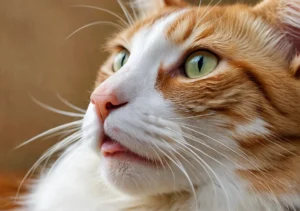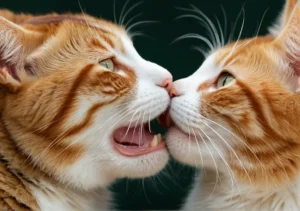Cats are fascinating creatures, full of mystery and wonder. From their playful antics to their independent nature, there’s no denying the allure of these enigmatic animals. But what happens when a cat starts displaying signs of psychogenic alopecia? Why do cats get psychogenic alopecia in the first place? Let’s dive into this intriguing topic and uncover the reasons behind this puzzling behavior.
Stress and Anxiety in Cats
Have you noticed your feline friend obsessively licking or chewing on their fur? This could be a sign of stress and anxiety in cats. Just like humans, cats can experience mental health issues that manifest in physical ways, such as excessive grooming leading to psychogenic alopecia.
Cats are sensitive creatures, and changes in their environment or routine can trigger stress and anxiety. Loud noises, new pets, moving homes, or even changes in their owner’s behavior can all contribute to their emotional well-being. This can result in behaviors like over-grooming, which can eventually lead to hair loss.
If you suspect your cat is experiencing stress and anxiety, it’s essential to create a calm and safe environment for them. Providing plenty of hiding spots, interactive toys, and designated quiet spaces can help alleviate their anxiety. Additionally, engaging them in regular playtime and maintaining a consistent feeding schedule can offer a sense of security and routine.
Remember, stress and anxiety can take a toll on your cat’s mental and physical health, so it’s crucial to address these issues promptly to prevent the development of psychogenic alopecia.
Environmental Factors
Did you know that your cat’s surroundings play a significant role in their overall well-being? Environmental factors can greatly impact your cat’s mental health and potentially lead to psychogenic alopecia.
Factors such as a lack of stimulation, overcrowding, or even exposure to harsh chemicals in cleaning products can contribute to your feline friend feeling anxious or stressed. This can manifest in behaviors like over-grooming, resulting in hair loss and psychogenic alopecia.
To create a cat-friendly environment, consider providing plenty of vertical space for climbing, hiding spots for relaxation, and interactive toys for mental stimulation. Additionally, ensuring a clean and non-toxic living space can help prevent unnecessary stress on your feline companion.
By optimizing your cat’s environment to promote mental well-being, you can reduce the likelihood of psychogenic alopecia and help your furry friend lead a happier and healthier life.
Behavioral Modification Techniques
When it comes to addressing stress-induced behaviors like psychogenic alopecia in cats, behavioral modification techniques can be a game-changer. One effective strategy is to create a calm and enriching environment for your feline friend. Make sure your cat has plenty of hiding spots, high perches, scratching posts, and interactive toys to keep them mentally stimulated and reduce anxiety. Additionally, establish a consistent daily routine for feeding, playtime, and social interaction to promote a sense of security. Engaging your cat in regular play sessions can also help redirect their focus and reduce stress levels. Remember, a happy and mentally stimulated cat is less likely to exhibit compulsive grooming behaviors.
Tips for Reducing Stress in Cats:
- Provide vertical spaces like cat trees for climbing and exploring.
- Use pheromone diffusers or sprays to create a calming environment.
- Implement puzzle feeders to encourage mental stimulation during meal times.
- Create a designated safe space where your cat can retreat to when feeling overwhelmed.
- Consider incorporating regular grooming sessions to help bond with your cat and reduce grooming-related stress.
Veterinary Intervention
Seeking professional help from a veterinarian is crucial when dealing with psychogenic alopecia in cats. A vet can perform a thorough physical examination to rule out any underlying medical conditions that may be contributing to the behavior. In some cases, medication or supplements may be prescribed to help manage stress and anxiety in your cat. Behavioral therapy or consultation with a feline behavior specialist could also be beneficial in addressing the root cause of psychogenic alopecia.
Remember, early intervention is key to preventing further hair loss and improving your cat’s quality of life. Don’t hesitate to reach out to your veterinarian for guidance and support in managing your cat’s psychogenic alopecia effectively.
For more information on feline behavior and stress management, check out this helpful resource.
Creating a Calm Environment
When it comes to helping prevent psychogenic alopecia in your furry friend, creating a peaceful environment is key. Cats are sensitive creatures, easily stressed by changes in their surroundings. Make sure to provide hiding spots, cozy beds, and vertical spaces for your cat to feel secure. Consider using pheromone diffusers or calming sprays to promote relaxation. Additionally, establishing a consistent routine for feeding and playtime can go a long way in reducing stress levels for your cat.
Distraction and Enrichment
To keep your cat’s mind engaged and prevent psychogenic alopecia, provide plenty of mental and physical stimulation. Interactive toys, puzzle feeders, and regular play sessions are great ways to keep your feline friend entertained. You can also try rotating toys and introducing new ones to prevent boredom. Creating a “cat TV” setup near a window with bird feeders or outdoor sights can offer hours of entertainment. Remember, a busy cat is a happy cat!
- Ensure your cat has access to scratching posts and cat trees to satisfy their natural instincts.
- Offer a variety of toys, including ones that mimic hunting behaviors to keep your cat engaged.
- Rotate your cat’s toys regularly to prevent them from losing interest.
By incorporating these tips and tricks into your cat’s daily routine, you can help reduce stress levels and keep psychogenic alopecia at bay. Remember, a happy and content cat is less likely to exhibit excessive grooming behaviors.
Holistic Approaches
When it comes to managing psychogenic alopecia in cats, considering holistic approaches can be beneficial. One holistic option is essential oils, such as lavender or chamomile, which can help calm anxious felines. Additionally, incorporating stress-relief techniques like regular play sessions, interactive toys, and creating a peaceful environment can significantly reduce stress levels in your cat. Remember, a calm and enriched environment can go a long way in preventing psychogenic alopecia.
Here are some holistic approaches to consider: – Acupuncture: This traditional Chinese medicine practice can help balance energy levels and alleviate stress in cats. – Massage Therapy: Just like humans, cats can benefit from gentle massages that promote relaxation and reduce tension in muscles. – Herbal Remedies: Some herbs like valerian or catnip can have calming effects on anxious cats.
For more information on holistic approaches for psychogenic alopecia in cats, you can visit The American Holistic Veterinary Medical Association for a list of accredited holistic veterinarians who can provide guidance and support.
Fun Facts About Cat Behavior
Did you know that cats have scent glands on their face, paws, and tail? By rubbing against surfaces, they are marking their territory with their scent. Understanding these natural behaviors can help prevent stress-induced conditions like psychogenic alopecia. Cats are creatures of habit and may develop stress-induced conditions when their routines are disrupted. Providing a predictable environment and creating a consistent daily routine for your cat can help reduce stress levels.
Here are some intriguing facts about cat behavior: – Kneading: Cats knead with their paws to mark their territory and show affection. – Purring: Cats purr not only when they are content but also when they are in pain or stressed.
By recognizing these unique behaviors in your cat, you can better address their needs and prevent stress-related issues like psychogenic alopecia.
Conclusion: The Importance of Mental Well-being in Cats
Cats getting psychogenic alopecia isn’t just about losing fur—it’s a sign that something deeper may be amiss. Just like us, our feline friends can experience stress and anxiety, leading to behavioral issues like excessive grooming. Prioritizing your cat’s mental well-being is crucial for their overall health. Providing a stimulating environment, ample playtime, and regular affection can go a long way in preventing stress-related conditions in cats. Remember, a happy mind leads to a healthy body, even for your fur babies.
Why Cats Get Psychogenic Alopecia:
When it comes to psychogenic alopecia in cats, there’s a clear connection between their emotional state and physical symptoms. Cats are highly sensitive animals, and changes in their environment or routine can easily trigger stress. This stress often manifests as excessive grooming, leading to hair loss. For cats, grooming is a soothing behavior, but when it becomes obsessive, it can indicate underlying anxiety. Consider your cat’s mental well-being as important as their physical health, and address any stressors in their environment promptly. Remember, a calm and happy cat is a healthy cat.
- Provide interactive toys to keep your cat mentally engaged.
- Create safe spaces where your cat can retreat when feeling overwhelmed.
- Consider environmental factors like loud noises or changes in routine that may be causing stress.
- Consult with your veterinarian to rule out any underlying medical issues contributing to your cat’s behavior.
Remember, your empathy and attention to your cat’s emotional needs can make a significant difference in their overall well-being. Give your feline friend the love and care they deserve, and watch them thrive both physically and mentally.
Alex, a passionate animal lover, has experience in training and understanding animal behavior. As a proud pet parent to two dogs and three cats, he founded AnimalReport.net to share insights from animal experts and expand his knowledge of the animal kingdom.




